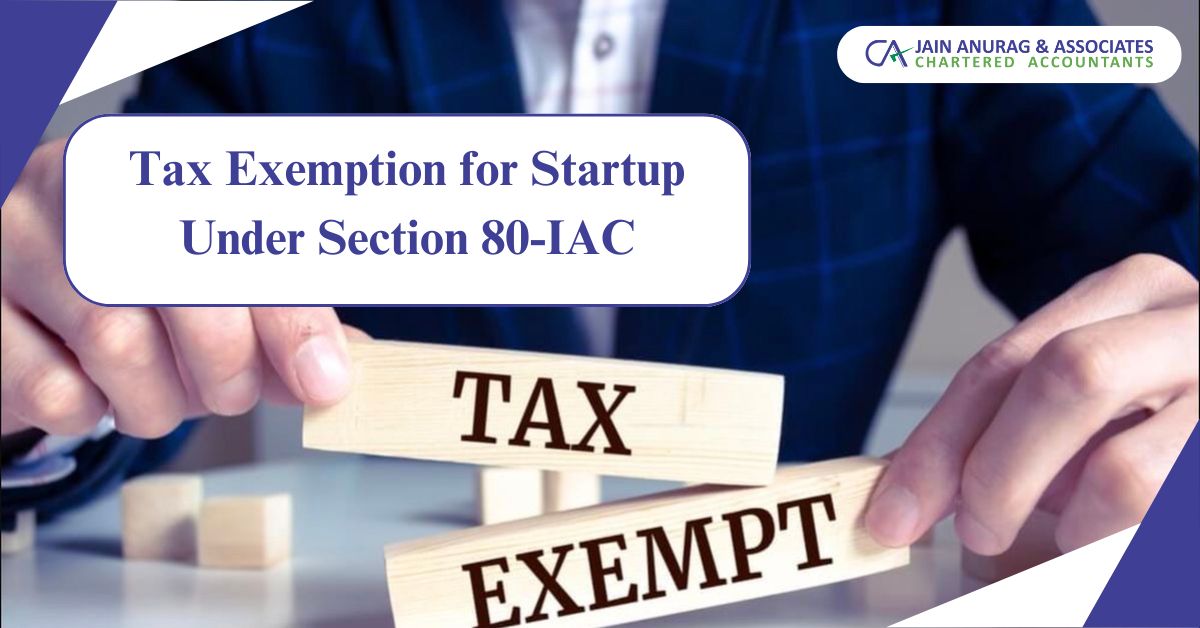Dec 10, 2024, Posted by Admin
How to Claim Tax Exemption for Your Startup Under Section 80-IAC

The Startup India initiative, launched by the Government of India, is a groundbreaking program designed to foster innovation and create a robust ecosystem for startups. It aims to drive sustainable economic growth and generate large-scale employment opportunities. One of the most significant incentives under this initiative is the tax exemption under Section 80IAC of the Income Tax Act. This blog delves into the details of this exemption, including eligibility criteria, benefits, and the application process.
Eligibility for Tax Exemption Under Section 80IAC
To avail of the benefits of Section 80IAC, startups must meet the following eligibility requirements:
1. Recognition by DPIIT
- The Department for Promotion of Industry and Internal Trade (DPIIT) must recognize the entity as a startup.
2. Legal Entity Structure
- Only entities registered as Private Limited Companies or Limited Liability Partnerships (LLPs) are eligible.
3. Incorporation Date
- The startup must have been incorporated on or after April 1, 2016.
4. Focus on Innovation
- The startup should be actively engaged in innovation, development, or improvement of products, services, or processes. Alternatively, it should operate a scalable business model with a high potential for employment generation or wealth creation.
What Qualifies as a DPIIT-Recognized Startup?
As per Notification No. G.S.R. 127(E) issued by DPIIT, startups must meet the following criteria to be recognized:
1. Business Structure
- The startup must be a private limited company, LLP, or a partnership firm registered in India.
2. Turnover Limit
- Annual turnover should not exceed ₹100 crore in any financial year since its incorporation.
3. Startup Tenure
- Entities will retain their startup status for up to 10 years from the date of incorporation.
4. Exclusions
- Businesses formed by splitting or reconstructing existing entities are not considered startups.
- A startup loses its recognition status if its turnover exceeds ₹100 crore or if it completes 10 years of incorporation.
Benefits of Section 80IAC Exemption
1. Tax Holiday
Recognized startups can avail a tax exemption for three consecutive financial years out of their first ten years of operation.
2. Encouragement for Innovation
The exemption allows startups to reinvest saved funds into their core areas, boosting innovation and scalability.
How to Apply for Tax Exemption?
Step 1: Registration on the Startup India Portal
Create an account on the Startup India portal and log in with your credentials.
Step 2: Submit Required Documents
Prepare and upload the following documents for review:
1. Memorandum of Association (for Private Limited Companies) or LLP Deed (for LLPs).
2. Board Resolution (if applicable).
3. Financial Documents:
- Annual accounts and income tax returns for the last three financial years (CA-certified).
- For startups incorporated after April 1, 2018, ITR submission is not mandatory.
4. Startup Video:
- A 2–5 minute video showcasing the product/service prototype or proof of concept.
- Highlight customer testimonials, reviews, or other forms of market traction.
Step 3: Submit a Pitch Deck
The pitch deck must cover:
1. Product/Service Overview: Description of the startup’s offerings.
2. Innovation and Scalability: Unique aspects and market differentiation.
3. Team Composition: Details of directors and key team members, including educational and professional backgrounds.
4. Revenue Model: Explain how the business generates revenue.
5. Funding: Disclose any funding received from investors or government bodies.
6. Awards and Recognitions: Highlight achievements, if any.
Tips for a Successful Application
1. Highlight Innovation: Clearly demonstrate how your startup contributes to innovation and scalability.
2. Market Evidence: Use client testimonials, contracts, or reviews to showcase market traction.
3. Adherence to Guidelines: Ensure compliance with industry-specific regulations (e.g., FSSAI, BIS).
Conclusion
The Section 80IAC tax exemption is a powerful tool for startups to optimize their financial resources and focus on innovation and growth. By meeting the eligibility criteria and following the outlined application process, startups can unlock significant tax benefits and contribute to India's dynamic entrepreneurial ecosystem.
If you are a startup aiming to make the most of this opportunity, start by registering on the Startup India portal and take the first step toward scaling new heights!